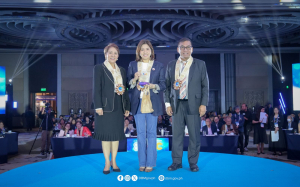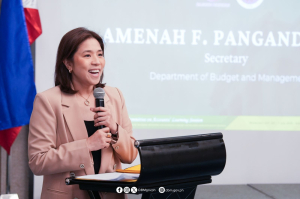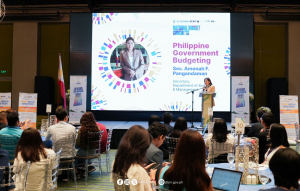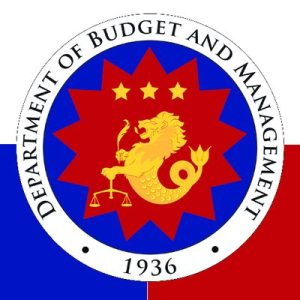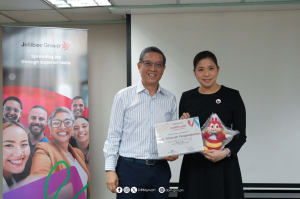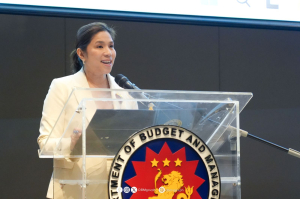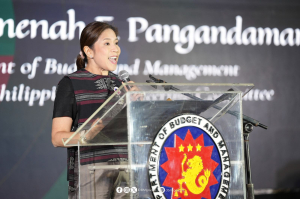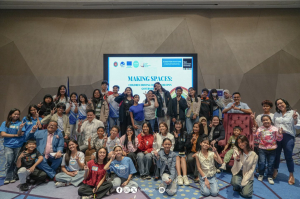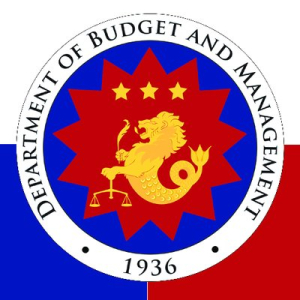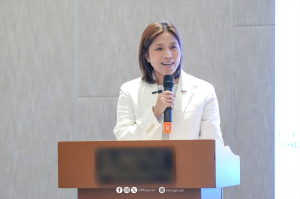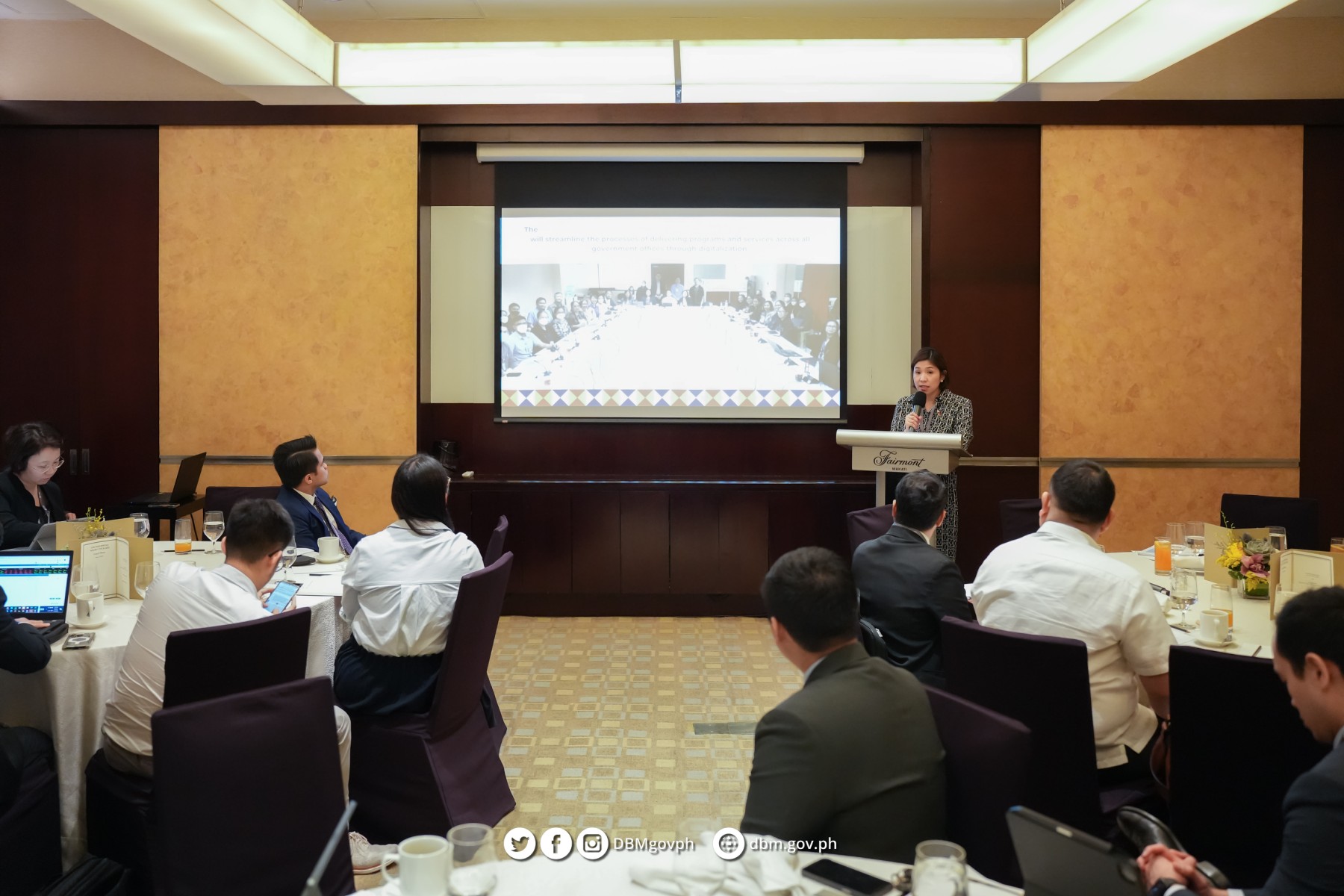
- Details

A pleasant afternoon to all.
Assalamu alaikum wa Raḥmatullahi wa Barakatuh.
“Think Growth, Think Philippines.”
This has been our call to foreign investors at the Philippine Economic Briefings, which we have already held in Singapore, New York, Frankfurt, London, and most recently in Tokyo, Japan, where it was entitled Philippine Business Opportunities Forum. Our heartfelt thanks to UBS for your support at the various briefings around the world.
I am glad to share that these briefings and forums are beginning to bear fruit. In Japan alone, we received investment pledges amounting to USD 13.0 billion, equivalent to about Php 714.0 billion, which are starting to materialize as we speak.
So this afternoon, we say it again: Think Growth, Think Philippines.
As you know, the Philippines’ gross domestic product or GDP full year growth rate for 2022 was 7.6 percent, beating everyone's expectations.
Given global headwinds, the Development Budget Coordination Committee or the DBCC set the growth target for 2023 at 6.0 to 7.0 percent, which is also consistent with the 2023 ADB growth forecast of 6.3 percent. We are confident in the Economic Team that once again, we will not only meet but beat our growth targets this 2023.
On the fiscal side, we remain on strong footing as we exceeded our fiscal targets for 2022. National government spending for 2022 increased to Php 5.2 trillion, which is higher by 10.4 percent year-on-year and outperforms the 2022 spending target by 4.1 percent. This is driven by higher capital expenditures mainly for road and transport infrastructure programs, among others.
Meanwhile, revenue collections exceeded the target by 7.3 percent while the deficit decreased to 7.3 percent of GDP, lower than the 8.6 percent deficit level in 2021. With this outturn, we are confident as well that we can still reach our fiscal targets under the Medium-Term Fiscal Framework.
Socioeconomic Agenda
To ensure that we do not neglect socioeconomic objectives even as we achieve high-growth performance and meet the targets of the Medium-Term Fiscal Framework, the priorities of the Marcos Jr. administration have been aligned with the 8-point Socioeconomic Agenda and the Philippine Development Plan (PDP) 2023 to 2028, which was launched last month, which include as objectives food security, improved transportation, affordable and clean energy, health care, social services, safe face-to-face education, sound fiscal management, and bureaucratic efficiency.
Our National Budget is also aligned with these objectives. Thus, the Social Services sector—comprising Education and Health—has been given the highest budget allocation with Php 2.0 trillion or 38.0 percent of the FY 2023 National Budget, while the Economic Services has been given the second highest share with Php 1.62 trillion or 30.8 percent as the government continues to push for infrastructure development.
Infrastructure Development
We will continue the Build, Build, Build program of the previous administration. As you know, we are now calling it Build, Better, More—or BBM—and we have allocated Php 1.3 trillion in the National Budget to sustain the momentum of the public infrastructure boom. The infrastructure disbursements will be maintained between 5.0 to 6.0 percent of the GDP in the medium term, reaching Php 2.3 trillion by 2028.
I am happy to share that just this month, the NEDA Board, chaired by the President, approved 194 high-impact and urgently-needed infrastructure projects, amounting to Php 9 trillion, to showcase the government’s Build, Better, More program—the Administration’s flagship program.
I think it is already uploaded in the NEDA website, the list of the 194 infrastructure flagship programs of the administration.
Infrastructure investment priorities include improving the access of the poor to basic services, public transportation, strengthening industry linkages, expanding both physical and digital connectivity, providing affordable and secure energy, and flood protection infrastructure.
The bulk of the infrastructure budget is intended for the development of physical infrastructures. This includes Php 478.7 billion for roads, Php 283.2 billion for flood control infrastructures, Php 164.1 billion for local infrastructure development, Php 48.1 billion for buildings, and Php 40.1 billion for railways.
For social infrastructure development, some Php 29.2 billion has been allocated for school buildings, Php 16.7 billion for water supply systems, Php 14.4 billion for hospital and health centers, Php 3.7 billion for power supply systems, and Php 2.5 billion for housing and community facilities. Similarly, Php 30.1 billion was allocated for irrigation systems while Php 1.2 billion was set aside for reforestation projects.
We are also keen on improving our digital infrastructure. Hence, while the Information and Communications Technology or ICT industry received the biggest bulk of foreign investments in the fourth quarter, amounting to Php 114.29 billion, to continue harnessing the potential of a digital economy and achieve universal connectivity, we have also allocated Php 24.13 billion for digital infrastructures in the country.
Finally, in line with our commitment to sustainability and in response to the growing demand for green investments, we have in the pipeline infrastructure investment opportunities that align with internationally accepted definitions of green investments.
Alternative Financing Strategy
To help finance all these, the Marcos Jr. Administration will utilize Public-Private Partnerships or PPPs. We recognize the important contributions of the private sector not only in bridging the infrastructure gap, but also in implementing and innovating climate change solutions, so we are working on the provision of legal and regulatory support to PPPs and the development of local PPP projects in priority sectors.
In addition, we are currently exploring the establishment of the Philippines' very first sovereign wealth fund. This has already been given the green light by the House of Representatives and is now being deliberated in the Senate. I think the sponsorship speech of the Chairman will be delivered on March 20, before the recess of Congress.
Legislative Reforms
Aside from the sovereign wealth fund, we also have the following legislative reform initiatives to promote transparency, efficiency and responsiveness in public service, with the end in mind of fostering a conducive business environment and investment climate in the Philippines, as stated in our Philippine Development Plan 2023-2028:
First is the Progressive Budgeting for Better and Modernized or PBBM Governance Bill. It aims to streamline the processes of delivering programs and services across all government offices through digitalization. This bill also seeks to institutionalize the Cash Budgeting System and other public financial management (PFM) reforms to ensure the timely implementation of programs and projects. This is proposed alongside the Budget and Treasury Management System or BTMS, a key digitalization measure that aims to further enhance the Government Integrated Financial Management Information System. As a central database, the BTMS will enable real-time mapping of transactions from purchase to payment.
Second, the amendment of the Government Procurement Reform Act or Republic Act 9184, which was passed twenty years ago or in 2003. Last October, I met with officials of the World Bank who have expressed their willingness to provide technical support as we study possible improvements in the law.
Third, the National Government Rightsizing Program or the NGRP. This seeks to upgrade the government’s institutional capacity to perform its mandate and provide better services while ensuring optimal and efficient use of resources. I am happy to note that the House of Representatives approved on second reading House Bill No. 7240 or the National Government Rightsizing Act just last Wednesday and the third Reading to be done today.
Aside from these, I am happy to share that the Regional Comprehensive Economic Partnership or RCEP was ratified by the Senate just last month. The Philippines is now part of the largest trade bloc in history.
DBM Reforms
In the meantime, as we wait for these laws to be passed, we are doing our part to begin the transformation towards a more transparent and efficient government.
The Department of Budget and Management will be launching its Digital Transformation Roadmap which promotes data governance and digitalization in fiscal-related government processes. I really believe that we need to fully embrace and transition to digitalization, especially for government processes. That is why at the DBM, digital transformation is at the core of our reform agenda.
Meanwhile, to ensure efficiency in meeting the targets set in the Administration’s Medium-Term Fiscal Framework, while acknowledging the competing demands of government programs against a backdrop of limited resources and fiscal space, in succeeding years, only high-impact and implementation-ready projects will be included in the budget.
So as you can see, this Administration is working very hard. We have a long list of reforms, initiatives, and plans—and best of all, a long list of investment opportunities!
With regulatory and institutional obstructions eliminated and technology adoption ramped up, we are confident that these initiatives will expedite government transactions, fight corruption by eradicating all forms of red tape, and ultimately, aid the country’s economic development and growth.
As we work towards single-digit poverty levels and upper middle income status, two of the major goals in our medium term fiscal framework, please continue to support our Agenda for Prosperity...that we may sooner achieve our economic transformation towards a truly inclusive, sustainable, and prosperous economy.
Remember: Think Growth, Think Philippines!
Maraming salamat po.
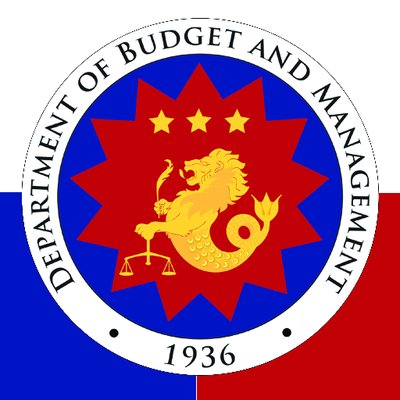
- Details
To HON. AHOD B. EBRAHIM, BARMM Interim Chief Minister;
BAINON G. KARON, Bangsamoro Women Commission (BCW) Chairperson;
HON. ATTY. PANGALIAN BALINDONG, Speaker, Bangsamoro Transition Authority;
DATU MOHD ASNIN PENDATUN, Cabinet Secretary and Representative of BARMM Ministries, Offices, and Agencies;
BAE DIAMILA D. RAMOS, Member of the Parliament and Committee Chair on Women, Youth & PWD;
Engr. MOHAJIRIN T. ALI, Director General, Bangsamoro Planning and Development Authority;
To our representatives from the Philippine Commission on Women, UNIPHYL WOMEN, PNP PRO BAR, UNFPA, UNDP, UN-WOMEN, SUBATRA, and UK Embassy;
And to all my fellow women leaders and public servants,
Assalamu alaikum wa Raḥmatullahi wa Barakatuh.
I am honored and privileged to speak before you today through this video message as you kick off the celebration of the National Women’s Month spearheaded by the Bangsamoro Women Commission.
The new theme for 2023 to 2028 emphasizes Women Empowerment: “WE for gender equality and inclusive society.” This is very much aligned with our Agenda for Prosperity which envisions an economic transformation that is inclusive and sustainable for all Filipinos—regardless of age, gender, and sociopolitical and religious affiliations.
We want to make sure that no one is left behind, especially women.
So first and foremost, I would like to greet and congratulate all the women in BARMM, especially for your contribution to strengthening communities and nation-building, advocating and fighting for peace and equality, and for lobbying for the passage of the Bangsamoro Organic Law that established the Bangsamoro Autonomous Region in Muslim Mindanao—a historic win for the whole country.
It is also a historic win that the Bangsamoro Organic Law provides for development programs, as well as mechanisms for consultations for women and marginalized sectors. More importantly, Bangsamoro women are now given reserved seats and sectoral representation in the Parliament and Cabinet, recognizing their role in governance and ensuring their fundamental equality before the law. As a woman leader myself, I strongly believe that things will work better, especially in the government, when we have more women in charge to bring equality to the table.
And so we, at the Department of Budget and Management, are determined to help BARMM as it undergoes transition and implements gender-responsive and special development programs for women.
We have appropriated Php 64.76 billion for BARMM’s Annual Block Grant; Php 5.0 billion as Special Development Fund for the rebuilding, rehabilitation, and development of conflict-affected communities; and Php 4.59 billion for its share in taxes, fees, and charges collected in the region. Meanwhile, Php 852.9 million has been allocated for the Normalization Program, and Php 36.1 million for the provision of socio-economic development assistance for former MNLF combatants in pursuit of the Government of the Philippines-MNLF Peace Process Program.
As a proud daughter of Mindanao and as Secretary of the Budget Department of our country—only the second woman to hold this position—I am committed to the realization of a BARMM that is thriving, with Bangsamoro women whose rights are protected and who are empowered to take part and take the lead in decision-making.
Indeed, we have come a long way in achieving peace and empowering women in our socioeconomic development agenda. Now that we have laid the groundwork for a sustainable and inclusive future, it is incumbent upon us to do more than what we have done in the past years, especially for women who weave our nation together.
This National Women’s Month, rest assured that the DBM is one with the Bangsamoro Women Commission in celebrating every woman. May we always find the strength and courage to hold our homes together, hone the next generations, and contribute to the achievement of our Agenda for Prosperity toward a genuinely inclusive society that values gender equality. Inshalah.
Mabuhay ang mga kababaihan. Mabuhay ang BARMM! Mabuhay ang Pilipinas.
Shukran. Maraming salamat po. Wabillahi Tawfiq Wal Hidaya, Wasalamu alaikum wa rahmatullahi wa Barakatuhu.
END

- Details
Assalamu alaikum wa Raḥmatullahi wa Barakatuh.
I am honored to celebrate National Women's Month with Filipino women everywhere in the world.
This month, we respond to the call for Women Empowerment and remember why we should stand tall and stand strong as women.
We remember all the women heroes we have had in our nation's history and thank them for blazing the trail for women leaders.
As the second female to helm the Department of Budget and Management, I would also like to honor in a special way the first female Budget Secretary: the late Secretary Emilia Boncodin who introduced groundbreaking reforms on budget and procurement, and inculcated a culture of transparency in public financial management.
And I would also like to give a shout-out to my fellow women in the Cabinet: Vice President and Education Secretary Sara Duterte; Tourism Secretary Maria Christina Frasco; Environment and Natural Resources Secretary Maria Antonia Yulo-Loyzaga; Migrant Workers Secretary Susan Ople; and of course to our First Lady, Atty. Louise Araneta Marcos. You are prime examples of empowered women and you serve as an inspiration to women everywhere who are standing for equality. Your presence and leadership in the Marcos Jr. Administration is also a testament to the commitment of President BBM to inclusivity, and to making sure that the best leaders have a seat at the table, regardless of gender.
Truly, we are committed to the theme of the National Women’s Month celebration for 2023 to 2028: “WE for gender equality and inclusive society.” This is already embedded in the 8-Point Socioeconomic Agenda and the Philippine Development Plan. This is also reflected in the “Women’s Budget” or the Gender and Development (GAD) budget policy directing all government departments and agencies to allocate a minimum of five percent of their total annual budgets under the General Appropriations Act.
So this National Women’s Month, we renew our commitment to uplifting women, especially Filipino women, everywhere: the Lea Salongas, the Hidilyn Diaz’s, the Pia Wurtzbachs, the Paz Marquez-Benitez’s, the Santanina Rasuls, your mother, your daughter, your sisters, and girlfriends.
We all have the power to contribute to a genuinely inclusive society that values gender equality.
Mabuhay ang mga kababaihan!
Wabillahi Tawfiq Wal Hidaya, Wasalamu alaikum wa rahmatullahi wa Barakatuhu.

- Details
To Climate Change Commission Vice Chairperson and Executive Director Robert E.A. Borje, Commissioner Rachel Anne S. Herrera, and Commissioner Albert P. Dela Cruz, Sr.; Commission on Higher Education Chairperson J. Prospero E. De Vera III; Governance Commission for GOCCs Commissioner Gideon D.V. Mortel; and Department of Environment and Natural Resources Director Elenida DR Basug;
And to all my fellow public servants from national government agencies, GOCCs, and state universities and colleges;
Assalamu alaikum wa Raḥmatullahi wa Barakatuh.
Welcome to the Annual Climate Change Expenditure Tracking or CCET Virtual Orientation in support of our 8-point Socioeconomic Agenda and the Philippine Development Plan (PDP) 2023 to 2028.
This January, we issued the National and Corporate Budget Calls and kick-started our budget preparation for FY 2024 with a series of budget forums. Indeed, this is a new opportunity for us to serve the people. But we are gathered here today not only for another round of budget preparations, but more importantly, to do our part in addressing a persisting threat to Filipino people’s lives, properties, and livelihood—climate change.
And so while we are on track with our Agenda for Prosperity, our efforts will be futile if we are unable to address climate change as it continues to pose significant risks to our economic development.
Thankfully, we have interventions such as CCET that allow us to monitor the scope and distribution of climate action in the country by identifying environment-related programs and projects within the national budget.
As stated in the World Bank Group’s Country Climate and Development Report for the Philippines published in November 2022, mainstreaming climate considerations in our public financial management is crucial in climate change adaptation and mitigation.
As such, our budget to address climate change will reach Php 464.5 billion this year, equivalent to 8.8 percent of the total national budget. This is significantly higher by 60.1 percent compared to last year’s allocation of Php 289.7 billion.
The government will also prioritize climate change mitigation and adaptation programs aligned with the National Climate Change Action Plan or NCCAP. Under NCCAP, water sufficiency projects are prioritized, cornering almost 80 percent of the total climate change budget. This is followed by sustainable energy, food security, ecosystem and environmental stability, climate smart industries and services, human security, and knowledge and capacity development.
We will also continue to prioritize programs that strengthen disaster resilience including the National Disaster Risk Reduction and Management Fund (NDRRMF) with Php 20.50 billion; Quick Response Fund with Php 17.15 billion; and Flood Management Program with Php 182.99 billion.
In order to preserve our natural resources, Php 2.39 billion was allocated for the National Greening Program; Php 1.86 billion for the Protected Areas Development and Management Program; Php 1.56 billion for the Manila Bay Rehabilitation; and Php 246 million for the Coastal and Marine Ecosystems Management Program.
As we kick-off this crucial undertaking for the FY 2024 National Budget, let us intensify climate change planning and programming, and increase the convergence and implementation of climate change and disaster risk reduction programs, activities, and projects through the NCCAP and the Risk Resiliency Program.
We are glad that you are all here today so that we at the DBM and the Climate Change Commission, with support from oversight agencies namely DENR, GCG, and CHED, can provide you with updated information and better understanding of climate change and CCET as an integral part of our national budget preparation.
As stated in the World Bank Report, responding to the challenge of climate change is well within our country’s capacity. In fact, in the President's Budget Message, it is clearly stated that "our economic transformation includes a transformation to a greener economy."
So I call on all our planning and budget officers and climate change technical representatives to work together and do everything in your capacity to efficiently and effectively execute climate change expenditure tracking. Through our concerted efforts to achieve a greener economy, we can give Filipinos a fighting chance to manage life’s uncertainties in the midst of climate change.
As you discuss the top climate risks and priorities, and linkages of the PDP 2023 to 2028, as well as the technicalities of entering CCET to the Online Budget Submission Portal or OBSP, may we keep in mind that we are doing all these to ensure that our economic progress is moving towards a truly inclusive and sustainable economy—one that will be felt by every individual, family, and entity in the country, and one that will benefit not only citizens in the world today but also in the generations to come.
Thank you very much. Wabillahi Tawfiq Wal Hidaya, Wasalamu alaikum wa rahmatullahi wa Barakatuhu.
END
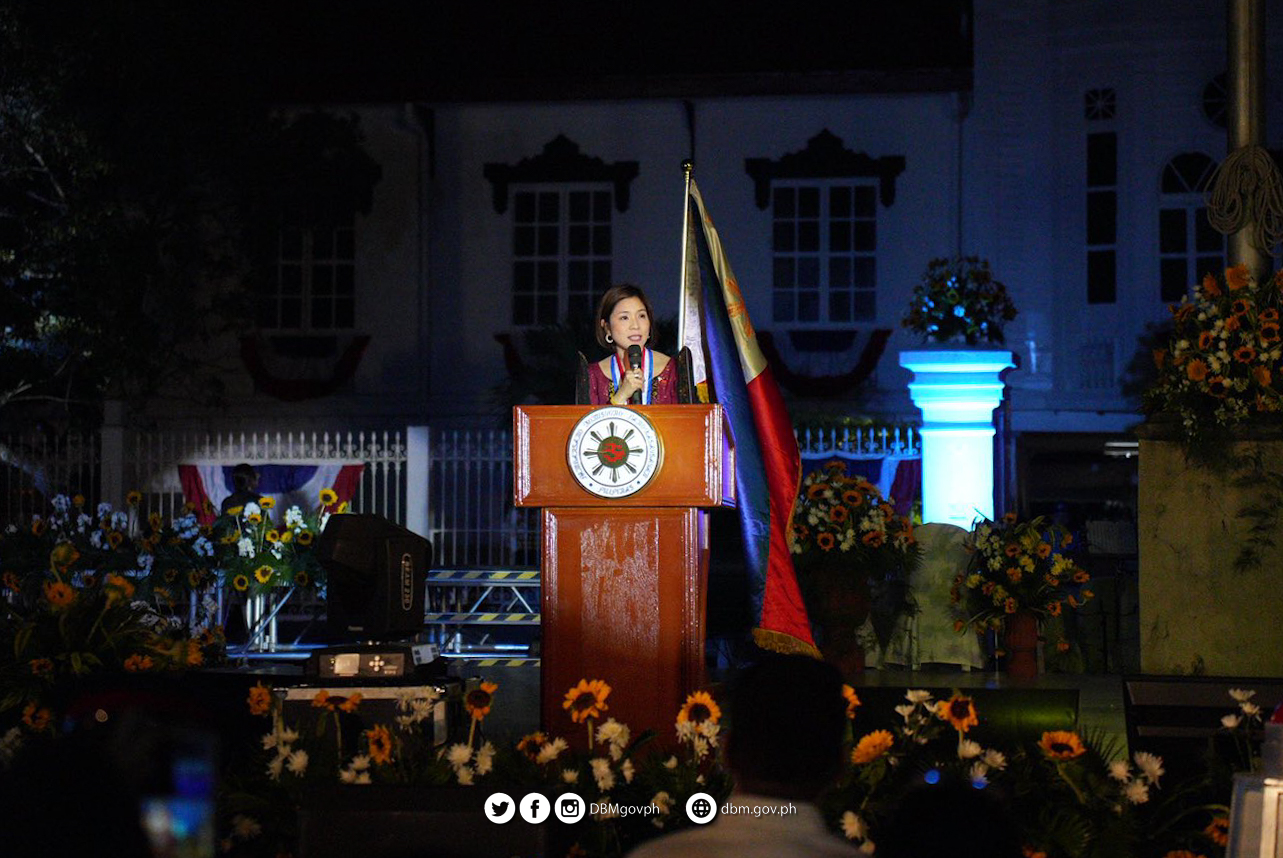
- Details

Mayor Angelo Emilio G. Aguinaldo; sa mga bumubuo ng Pambansang Komisyong Pangkasaysayan ng Pilipinas na pinangungunahan ni Dr. Emmanuel F. Calairo; at sa lahat po ng naririto, isang mapagpalaya at pinagpalang gabi po.
Bago po ang lahat, maraming salamat po sa inyong pag-anyaya sa akin upang magbigay ng pambungad na mensahe sa isandaang araw na paglulunsad ng ika-isang daan at dalawampu’t limang (125) Anibersaryo ng Kalayaan at Pagkabansang Pilipino 2023-2026.
Higit pang nakagagalak ang anibersaryong ito dahil sa kauna-unahang pagkakataon ay hindi lamang isa, kundi tatlong taon ang ating selebrasyon—mula 2023 hanggang 2026—at sa pamumuno ni Dr. Emmanuel F. Calairo ay ilulunsad ang mga panandang pangkasaysayan sa iba’t ibang bayan sa buong Pilipinas.
Bilang natatanging miyembro ng gabinete na Muslim, ako po ay lubusang nagagalak sa aking pagdalo dito dahil—kung hindi po ako nagkakamali—ito ang kauna-unahang pagkakataon na isang Maranao ang magsasalita sa okasyon ng pagdiriwang ng anibersaryo ng ating kalayaan.
Dito sa Kawit unang iwinagayway ang ating bandila, ngunit maipagmamalaki naman naming mga taga-timog na masigasig at magiting na ipinaglaban ng mga taga-Mindanao ang ating lupang sinilangan.
Samakatuwid, mahigit tatlong daang taon ang pagsakop ng mga Kastila sa Luzon at Visayas, ngunit hindi nasakop ng mga banyaga ang Mindanao. Dahil matinding ipinaglaban ng mga Moro ang ating lupa, pati na din ang ating kultura, patakaran, at paniniwala ng mga taga-Mindanao.
Kaya malayo man kami sa Kawit, kasali po kami sa pagpapasalamat para sa kasarinlan ng Pilipinas at sa pagmamalaki ng katanyagan ng ating lupang sinilangan.
Tunay naman na dapat ipagmalaki at ipagdiwang na isang daan at dalawampu’t limang taon na ang nakalipas, subalit ang araw at mga bituin ng ating bandila—na unang iwinagayway dito sa Cavite at bumuhay sa alab ng puso ng mga Pilipino—ay higit pa ring nagniningning sa bawat sulok ng ating mahal na Pilipinas—sa Luzon, Visayas, at sa Mindanao.
Nakatataba nga naman ng puso na kahit nagmumula tayo sa iba’t ibang rehiyon ng bansa, iisa pa rin ang pintig ng ating damdamin—ang pagmamahal natin para sa ating inang bayan.
Kaya naman pagkakaisa—o unity—ang panawagan ng ating Pangulong Ferdinand R. Marcos Jr.
Dahil ang paglayang minamahal ay hindi naman para sa iilan lamang, kundi para sa lahat.
At iyan ang layunin ng ating Agenda for Prosperity o ang ating patakaran tungo sa kasaganahan. Lahat ng ginagawa ng pamahalaan ngayon ay para sa kasaganahan ng sambayanang Pilipino: Economic Transformation Towards Inclusivity and Sustainability o ang pagpapalaganap ng ating ekonomiya para sa lahat, kasama na din ang mga susunod na henerasyon.
Sinisikap po ng kasalukuyang administrasyon na maiangat ang buhay ng bawat mamamayan sa pamamagitan ng economic growth. At unti-unti ay nakakamit na po natin ito. Noong nakaraang taon, ang ating Gross Domestic Product o ang tinatawag na GDP ay lumago ng 7.6 percent, higit pa po ito sa mga estima ng pinakamagaling na mga ekonomista hindi lamang sa Pilipinas, kundi sa buong mundo.
At upang maramdaman naman po ng lahat ang kasaganahan, sinisikap din po namin na maiparating ang mga proyekto ng ating gobyerno, hindi lamang sa Metro Manila, kundi mula Aparri hanggang sa Tawi-Tawi.
Kaya din naman pati ang Bangsamoro Autonomous Region in Muslim Mindanao o BARMM ay hindi nakakaligtaan at nabigyan na ng Block Grant na mahigit sa Php 66 billion.
Tutulungan din po natin ang bawat lokal na pamahalaan na maging empowered sa pamamagitan ng devolution, alinsunod sa Executive Order No. 138 at sa Mandanas-Garcia Supreme Court ruling.
At sisikapin naman po natin na magkaroon ng tinatawag na bureaucratic efficiency o mabilis na pag-aksyon ng pamahalaan, pati na din ang pagkakaroon ng transparency at accountability sa pamamagitan ng digitalization. Mayroon po tayong Digital Transformation Roadmap na susundin upang maging mas mabilis at mas tapat ang mga sistema ng buong gobyerno.
Para makilala at matandaan naman po ng mga susunod na henerasyon ang kahalagahan ng mga okasyong katulad nito ngayon, naglaan na po tayo ng higit sa tatlong daan at apatnapu't apat na milyong piso (Php 344.63 million) para sa Pambansang Komisyong Pangkasaysayan ng Pilipinas o National Historical Commission of the Philippines. Sa ilalim po nito, mahigit limampu’t pitong milyong piso (Php 57.01 million) ang nakalaan para sa kanilang Historical Commemoration and Promotion Program.
Napakarami pa po nating mga proyekto at patakaran para sa tinatawag nating Agenda for Prosperity. Ngunit hindi natin ito makakamit kung ang gobyerno lamang ang gagalaw. Kailangan po natin ang kooperasyon ng bawat mamamayan.
Kaya nais ko pong imbitahan kayong lahat na patuloy na isa-puso ang mga aral ng ating nakaraan dahil ito po ang tanging paraan sa ating pag-usad bilang isang bayan.
Huwag po nating kalimutan na ang kalayaang tinatamasa natin ngayon sa kasalukuyan ay bunga ng kagitingan at pag-aalay ng sarili para sa bayan ng ating mga ninuno.
Kaya sama-sama po nating isakatuparan ang ating hangarin para sa mas maganda, masagana, at mapayapang kinabukasan ng ating mga kababayan at ng mga susunod pang mga henerasyon…
…upang makita din po ng mga Pilipino dito sa Pilipinas at sa pinakamalayong dako ng ating archipelago, at pati na rin sa iba't ibang dako ng mundo, ang kislap ng ating watawat, ang tagumpay na nagniningning.
Mabuhay po kayo! Mabuhay ang Pilipinas at mga Pilipino!
Assalamu alaikum. Maraming salamat po.
